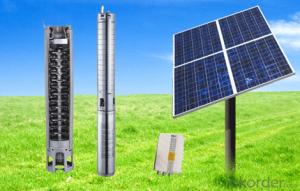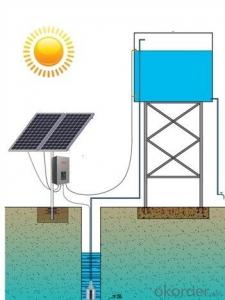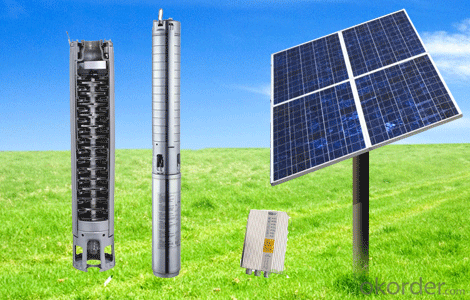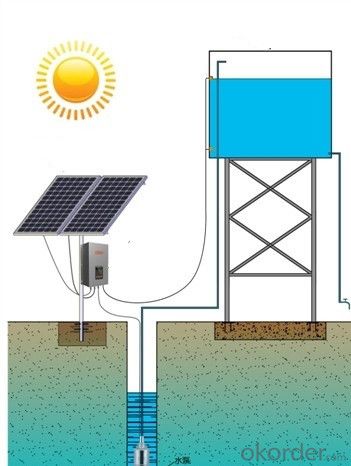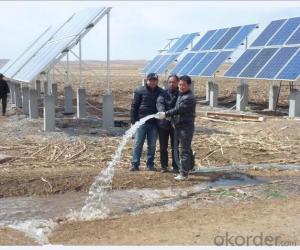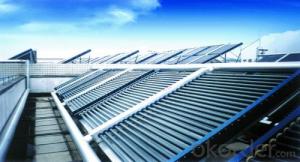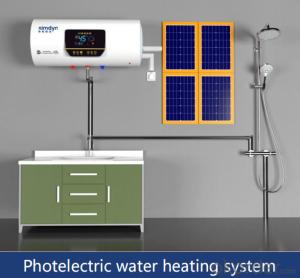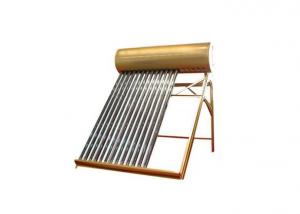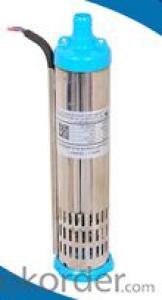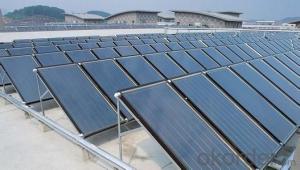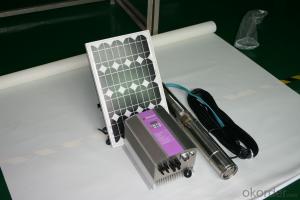Solar Pump Factory Homemade Solar Water Heater
- Loading Port:
- Shanghai
- Payment Terms:
- TT OR LC
- Min Order Qty:
- 1 set
- Supply Capability:
- 1000 set/month
OKorder Service Pledge
OKorder Financial Service
You Might Also Like
Solar Pump Price Homemade Solar Water Heater
DC solar water pumping system consists of the motor, pump, controller, solar array and some other accessories, such as water level sensor, float switch, etc. Considered that storing water is more efficient than storing electricity, the system is designed to directly drive the pump without battery which can reduce the construction and operating cost and routine maintenance effectively.The PV array consists of multiple solar panels connected in series/parallel, which can supply the whole system as power source by converting the absorbed solar radiation energy to the electrical energy. The pump driven by a brushless DC permanent magnet motor draws water from deep-well or river. The pumped water is then fed into reservoir or water tank, or connected to the irrigation system or fountain system directly.
Advanced Technology
Applications Innovation
The efficiency of DC brushless permanent magnet motor has been increased up to 25% in comparison with traditional asynchronous motor.
Technology Innovation
Stator and rotor are sealed by environment friendly casting resin.Motor insulation resistance can be hold higher than 300MΩfor more than 10 years, which consumedly increased the security and reliability of the submersible motor.
Structure Innovation
Casting resign technology processed stator and rotor as well as the water lubricated bearing make the submersible pump environment friendly.
Feature
High Efficiency & High Reliability
DC Brushless Permanent Magnet Motor
Minimum Maintenance, long Service Life
Environment Friendly Materials, Lubricated Without Oil
Application
Village or Family Water Supply
Animal Drinking Water & Livestock Watering
Garden/Courtyard Irrigation
Swimming Pool
Water Supply for Bivouac or Camping Car
Water Supply for Remote Area
Automatic Control
Operate Automatically, No Need Watching
Maximum Power Point Tracking (MPPT)
Dry-run Protection
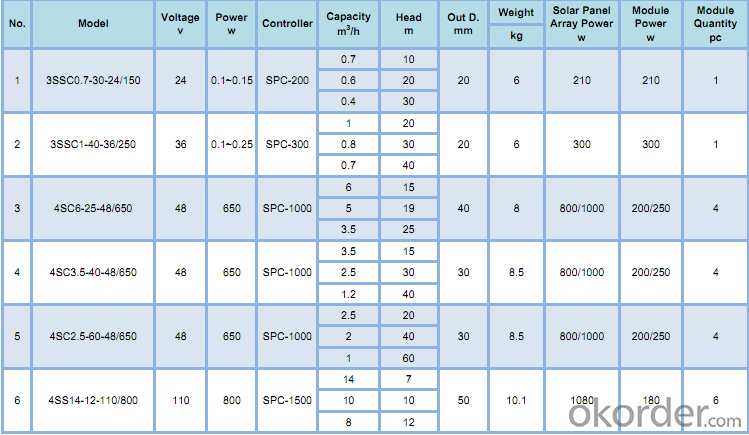
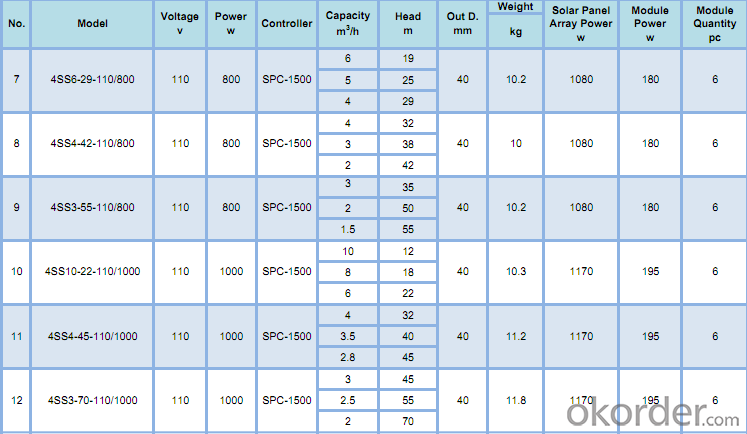
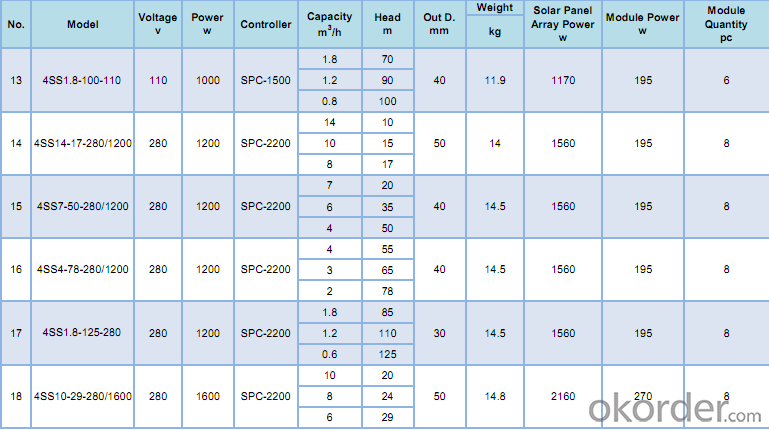
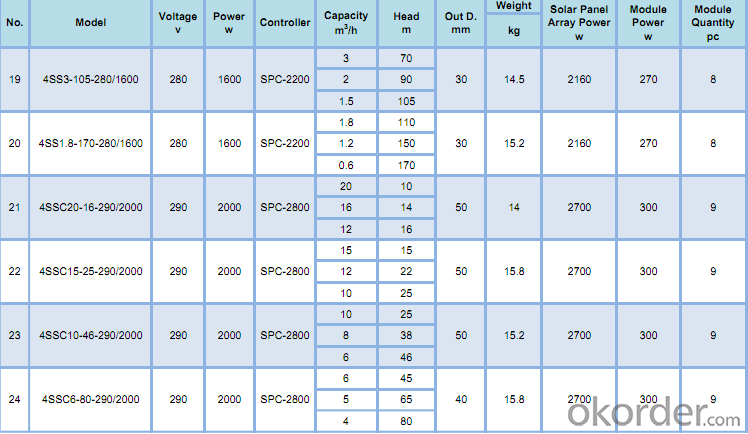
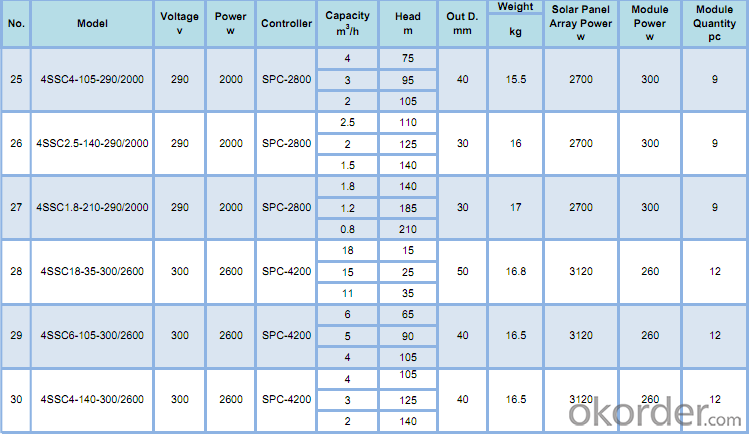
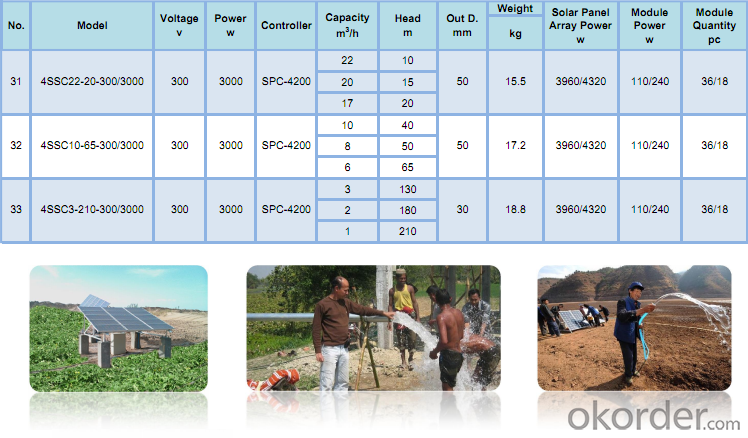
- Q: How does a solar pump help in water conservation?
- A solar pump helps in water conservation by utilizing the sun's energy to power the pump and draw water from sources such as wells or rivers. This eliminates the need for fossil fuels or electricity, reducing carbon emissions and the strain on traditional energy resources. Additionally, solar pumps can be designed with efficient water delivery systems, ensuring that water is distributed precisely and wastage is minimized. Overall, solar pumps contribute to sustainable water management and conservation efforts.
- Q: Can solar pumps be used for water supply in refugee camps or temporary settlements?
- Yes, solar pumps can indeed be used for water supply in refugee camps or temporary settlements. Solar pumps use solar energy to power the pumping mechanism, making them a sustainable and viable option in areas where access to electricity may be limited or unreliable. They can provide a reliable and cost-effective solution for accessing clean water, which is essential for the well-being and survival of individuals in refugee camps or temporary settlements. Additionally, solar pumps are easy to install and maintain, making them suitable for temporary or mobile setups.
- Q: Can a solar pump be used for water circulation in a pond?
- Yes, a solar pump can be used for water circulation in a pond. Solar pumps are designed to operate using solar energy, making them an environmentally friendly and cost-effective option for pond circulation. These pumps utilize the power of the sun to circulate and aerate the water, helping to maintain its quality and prevent stagnation. They are easy to install, require minimal maintenance, and can be a great solution for promoting a healthy ecosystem in a pond.
- Q: Can a solar pump be used for frost protection in agricultural fields?
- Yes, a solar pump can be used for frost protection in agricultural fields. Solar pumps are an effective and environmentally friendly solution for various agricultural applications, including frost protection. These pumps use solar energy to power the water circulation system, which helps prevent frost damage to crops. During periods of cold weather, farmers can use a solar pump to distribute water throughout the agricultural field. This water can be sprayed onto the crops or applied through a drip irrigation system, forming a protective layer of ice that insulates the plants from freezing temperatures. The ice formation releases latent heat, which maintains the temperature around the crops and prevents frost damage. Solar pumps are particularly useful in remote agricultural areas where access to electricity may be limited or unreliable. They operate independently of the power grid, relying solely on the sun's energy to function. This makes them a cost-effective and sustainable solution for frost protection, as they reduce the reliance on traditional energy sources and minimize operational costs. Furthermore, solar pumps are typically low-maintenance and have a long lifespan, providing farmers with a reliable and durable solution for frost protection in their agricultural fields. They can be easily integrated into existing irrigation systems, allowing for seamless integration and efficient water distribution. Overall, a solar pump can effectively be used for frost protection in agricultural fields, offering a sustainable, cost-effective, and reliable solution for farmers to safeguard their crops against freezing temperatures.
- Q: What is the impact of a solar pump on poverty alleviation?
- The impact of a solar pump on poverty alleviation is significant. It provides access to clean and affordable water for communities in areas with limited or no access to electricity. This helps in improving agriculture productivity, enabling irrigation for crops and livestock, leading to increased food security and income generation. It also reduces the burden of women and children who usually bear the responsibility of fetching water, allowing them to invest their time in education and income-generating activities. Overall, the use of solar pumps contributes to poverty reduction by addressing one of the basic needs and empowering communities to become more self-sufficient.
- Q: Can a solar pump be used for water supply in remote military bases?
- Yes, a solar pump can be used for water supply in remote military bases. Solar pumps are an efficient and sustainable option for supplying water in remote areas where traditional electricity sources may not be available or reliable. The use of solar energy eliminates the need for fuel and reduces operational costs. Additionally, solar pumps are easy to install, require minimal maintenance, and can provide a reliable water supply for various military operations.
- Q: How does the slope of the terrain affect the installation of a solar pump?
- The slope of the terrain can greatly affect the installation of a solar pump. If the terrain is steep or uneven, it may be more difficult to properly position and mount the solar panels for optimal sunlight exposure. Additionally, the pump's efficiency may be affected if it is not properly aligned with the slope, as this can impact the flow of water and the pump's performance. Therefore, it is important to carefully consider the slope of the terrain during the installation process to ensure the solar pump operates effectively.
- Q: Are there any limitations to the distance a solar pump can pump water?
- Yes, there are limitations to the distance a solar pump can pump water. The main limitation is the power output of the solar panels. Solar pumps rely on solar energy to generate electricity which powers the pump. As the distance between the pump and the solar panels increases, the amount of energy that can be transferred decreases. This means that the pump may not be able to generate enough power to pump water over long distances. Additionally, the size and power of the pump itself also play a role in the maximum distance it can pump water. Smaller pumps may have limited pumping capabilities and may struggle to push water over long distances, especially if there are significant elevation changes. Other factors such as the terrain, pipe diameter, and the presence of any obstacles can also affect the distance a solar pump can effectively pump water. For example, if there are steep inclines or rough terrain along the pumping route, the pump may struggle to overcome the resistance and maintain the required pressure to move water effectively. Therefore, while solar pumps can be an efficient and sustainable solution for pumping water, it is important to consider the limitations in terms of power output, pump size, and other factors that may restrict the distance the pump can effectively operate.
- Q: Can a solar pump be used for water supply in remote farms or ranches?
- Absolutely! A solar pump is an excellent choice for supplying water to remote farms or ranches. When there is no access to grid electricity, solar pumps are the perfect solution. They harness solar energy to operate the pump, eliminating the need for fuel or electricity from the grid. Remote farms or ranches greatly benefit from solar pumps. They offer a cost-effective and sustainable water supply solution. By avoiding the use of expensive and unreliable fuel-powered generators or the installation of long power lines, these pumps provide a practical solution. Moreover, solar pumps are easy to install and require minimal maintenance. They are designed to work efficiently even in harsh weather conditions and can extract water from deep wells or boreholes. Whether it's for irrigation, livestock watering, or even everyday domestic use, solar pumps can handle a variety of water supply applications. Using a solar pump for water supply in remote farms or ranches brings numerous advantages. It reduces reliance on fossil fuels, decreases operational costs, and supports environmental sustainability. Additionally, it ensures a consistent and uninterrupted water supply, promoting smooth agricultural activities in these isolated areas. In conclusion, a solar pump is an incredibly suitable and pragmatic choice for water supply in remote farms or ranches. It offers an affordable and sustainable solution, providing a dependable water source for various agricultural needs.
- Q: Can solar pumps be used for swimming pool circulation?
- Yes, solar pumps can be used for swimming pool circulation. Solar pumps use the energy from the sun to power the pump, eliminating the need for electricity. They are an eco-friendly and cost-effective option for pool circulation, ensuring proper water circulation and filtration.
Send your message to us
Solar Pump Factory Homemade Solar Water Heater
- Loading Port:
- Shanghai
- Payment Terms:
- TT OR LC
- Min Order Qty:
- 1 set
- Supply Capability:
- 1000 set/month
OKorder Service Pledge
OKorder Financial Service
Similar products
Hot products
Hot Searches
Related keywords
